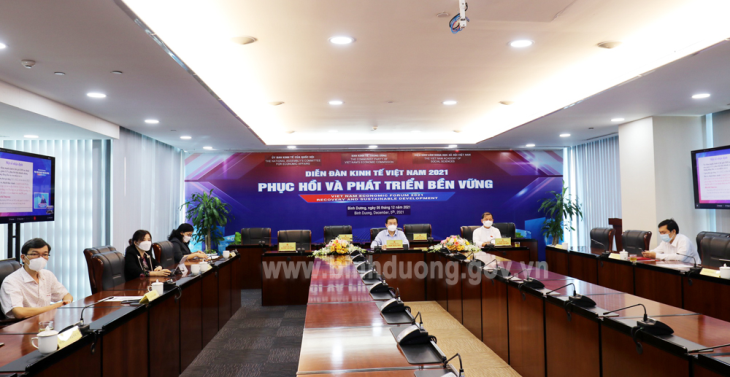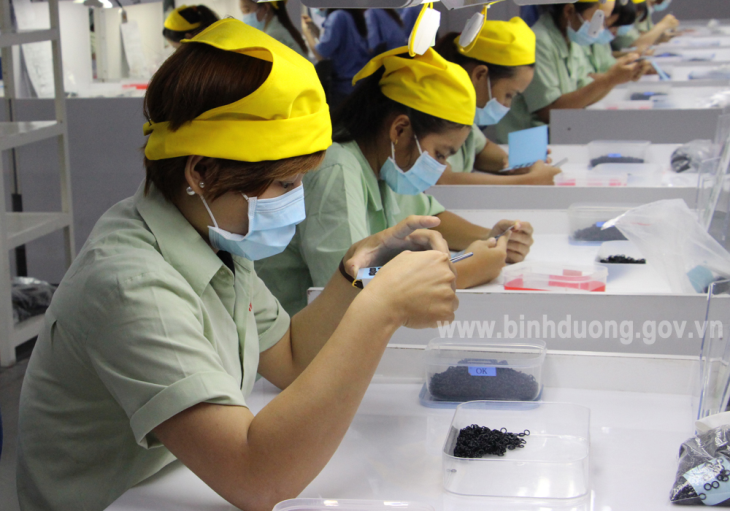The forum was organized in the form of face-to-face combined with online at 57 domestic and international bridge points.
Attending at Binh Duong bridge point were Mr. Pham Trong Nhan - Deputy Head of Provincial Delegation of National Assembly Deputies and provincial National Assembly deputies; representatives of provincial departments, committees and branches.
Proposing fiscal and monetary policies
Speaking at the Forum, domestic and international experts said that the Covid-19 pandemic has severely affected the socio-economic development of all countries in the world, including Vietnam. Over the past time, the Government of Vietnam has promptly issued many solutions and policies to support and solve difficulties and problems of people, workers and enterprises. Support solutions are integrated with the development policy of priority sectors and fields, especially supporting sectors and fields that are heavily affected by the pandemic. At the same time, the implementation of policy solutions has contributed to stabilizing the macro-economy, ensuring social security, mitigating the impact of the pandemic, keeping people safe and stabilizing the society. This is an important foundation for the process of socio-economic recovery and development associated with pandemic control.

Delegates attend at Binh Duong bridge point
However, the supporting solutions have been issued mainly to solve short-term difficulties of people and enterprises, not focusing on stimulating consumption, aggregate supply and aggregate demand, or supporting the development of the domestic market, restoring supply chains, production, and labor. The implementation of some policies is still slow, the disbursement rate is low, and some policy groups have tight conditions, making it difficult for beneficiaries to access, leading to low policy implementation efficiency.
Therefore, experts recommend that in the coming time, priority should be given to continuing to effectively prevent and control the Covid-19 pandemic, in parallel with speeding up the vaccination process. Soon developing and implementing a Master Program on economic recovery and development during and after the Covid-19 pandemic, divided into phases and integrated throughout the requirement to promote economic institutional reform in parallel with economic recovery. Applying flexible macroeconomic policies according to scenarios to cope with adverse developments of the world and regional economies. Speeding up the implementation of the issued support packages for people and enterprises; regularly evaluating the results of the implementation of support packages and immediately removing obstacles in the implementation process.
Dr. Can Van Luc - Chief Economist of BIDV, member of the Vietnam National Fiscal and Monetary Policy Advisory Council and other expert groups proposed a support package including fiscal, monetary, and social security together with policies amounted to 843,845 billion VND, accounting for 10.38% of GDP (announced value).
Of these, fiscal policy accounts for the largest share in the structure with 8.34%, equivalent to 678,395 billion VND; monetary policy is 65,000 billion VND (accounting for 0.8%), social security policy is 12,800 billion VND (accounting for 0.16%), other policies is 37,650 billion VND (0.46%); Investment of State Capital Investment Corporation (SCIC) in enterprises is 50,000 billion VND (accounting for 0.6%).
According to experts, to promote the implementation of the above priorities, the role of the National Assembly is very important. In the coming time, the National Assembly may consider a number of issues such as: Promoting law-making to ensure timeliness, quality, and reduce overlap, thereby strengthening the legal framework for production and business activities, including new economic activities. Regularly listening to the voice of voters in localities throughout the country; strengthening supervision, especially thematic supervision of areas of special interest to voters; accompanying the Government to remove difficulties and obstacles for enterprises and people, rationally and effectively mobilizing resources to promote socio-economic recovery and development. Continuing to accompany and set requirements for the Government to more effectively implement free trade agreements (FTAs) in the new context; which focuses on strengthening the propaganda and dissemination of FTAs; continuing to review and perfect the legal system and policies to fully implement the commitments in the FTAs; assessing the competitiveness of economic sectors and proposing directions for improvement; simplifying administrative procedures; Government enforcement agencies regularly consult the enterprise community, etc.
Supporting enterprises to restore production
Providing information on the operation of the enterprise recently, Dr. Dau Anh Tuan - Head of the Legal Department of the Vietnam Chamber of Commerce and Industry (VCCI) said, the Covid-19 pandemic wave from April 2021 to now has had a serious impact on the production and business activities of Vietnamese enterprises. The survey results conducted by VCCI from the beginning of July to the middle of September 2021 with nearly 3,000 respondents operating in 63 provinces and cities of Vietnam showed that up to 93.9% of enterprises rated the impact of the pandemic at "completely negative" and "mostly negative". This number is up from 87.2% of the 2020 survey. Specifically, in the 2021 survey, about 60% of enterprises said the impact of the Covid-19 pandemic was "mostly negative". Notably, the percentage of enterprises that considered the Covid-19 pandemic to have a "completely negative" impact is up to 34%, significantly higher than 15% of the 2020 survey. The September 2021 survey also recorded that only about 4% of enterprises were not affected by the pandemic and less than 2% of enterprises said they had grasped the opportunity to develop.
Almost enterprises in all fields and industries are facing difficulties due to the Covid-19 pandemic. The survey showed that industries that frequently require direct communication or involve the movement of people were most negatively impacted by the pandemic, specifically, 99% of enterprises in the fields of education and training, accommodation and food services, healthcare and social assistance, etc. were affected at "mostly negative" and "completely negative" levels. The impact level of the Covid-19 was lowest among enterprises in industries such as production and distribution of electricity, gas, hot water and water supply, and waste treatment, but also 88.2% and 76.5% of enterprises in these industries, respectively, reported being negatively impacted.

Dr. Dau Anh Tuan - Head of Legal Department of Vietnam Chamber of Commerce and Industry (VCCI) speaks at the Forum
Proposing solutions in the medium and long term to support enterprises to restore production and business, adapt to the "new normal", according to Dr. Dau Anh Tuan, in order to restart the economy, in addition to focusing on manufacturing enterprises and enterprises in the supply chain, it is also necessary to note support policies suitable for individual business households, micro and small enterprises. These subjects are strongly affected by the tightening measures to prevent and control the pandemic, and their self-healing ability is poor, but they play an important part in reducing the pressure on social security, which is one of the driving forces to stimulate demand in the future.
Also according to experts' suggestions, in order for production and business activities to be restarted and quickly accelerated, regulations on pandemic prevention and control as well as a roadmap for loosing the distancing and reopening, there needs to be coordination and agreement among localities to ensure the recovery and stability of the supply chain, enterprises take the initiative in making suitable production and business plans, minimizing the risk of supply disruptions, not ensuring order progress, causing great damage to enterprises.
In the medium and long term, in addition to parallel implementation of supporting policies on taxes, fees and credits, restructuring policies towards sustainable development also need to be be built right now. Specifically, continuing to promote solutions to improve the business environment, promote public investment, develop infrastructure to ensure safety and security for production and business activities of enterprises; having a clear economic recovery roadmap to support enterprises and the economy; having a scenario of long-term coexistence with the pandemic that is feasible and resilient to enterprises. Improving logistics infrastructure as well as related administrative procedures to facilitate transport and import and export activities, especially for agricultural and aquatic products to increase the competitiveness of Vietnamese goods. Continuing to review and adjust investment incentive policies to attract a wave of high-quality foreign investment and investment in supporting industries. Identifying digital economic development as the growth engine of the economy, creating a mechanism to promote e-commerce (electronic trading platform, technology transportation, online wholesale market, etc.); supporting innovation activities; supporting enterprises in digital transformation.
Ensuring social security and labor supply
According to statistics, in 2021, the Covid-19 pandemic has affected 9.1 million workers. In the first 9 months of 2021, more than 10 million workers in enterprises were affected. In which, about 144,000 workers lost their jobs, 2.1 million people had to temporarily stop working, suspending production and business activities, about 3 million people had to reduce working hours, take unpaid leave for extended work, take unpaid leave alternately, and about 840,000 people were forced to change their job form. In particular, about 4.7 million workers in enterprises have had their incomes reduced. In the informal sector, about 3.5 million workers have their income reduced, accounting for nearly 90% of the informal sector workers affected by Covid-19.
Facing the above situation, experts proposed, to have a policy to restore and develop the labor market, in which attention is paid to the connection of job supply – demand, especially providing quick, timely and convenient job information for workers to access job opportunities, support packages of the State and employers to "retain" and attract workers to return to the city to work. Promoting and having incentive mechanisms to encourage employers to come up with solutions to attract workers to work at the enterprise; renovating and improving the actual effectiveness of policies on vocational training and vocational skills training to maintain jobs for workers and adapt to and anticipate digital transformation. Developing labor standards and mechanisms to adjust new labor relations in line with the Covid-19 situation.

It is necessary to have many policies to ensure social security and recover the labor market after Covid-19
At the same time, there are preferential support policies for enterprises, agricultural cooperatives and women-owned business households to recover after the pandemic. There are fundamental solutions to narrow the gender gap in education, training, vocational training, access to information, application of science, technology, markets and business development consulting for girls and women to support the increase in the number and size of women-led enterprises.
Reforming administrative procedures of support packages in the direction of simplicity, speed, timeliness, application of information technology for easy access by people, workers, enterprises, and disadvantaged subjects. Continuing to prioritize support for vulnerable workers, paying special attention to taking care of vulnerable and freelance workers who lost their jobs during the quarantine period for pandemic prevention and control such as: mobile lottery ticket sellers, porters, teachers at private preschools, hairdressing and hair-washing service workers; domestic workers, hired workers at small business establishments, etc.
Studying the decentralization of production and population in some big cities to rural areas with a large number of workers for economic development, along with improving and developing the infrastructure system, especially transport infrastructure to overcome the negative impacts of pandemic such as Covid-19 on the Southern economic and industrial centers (Ho Chi Minh City, Binh Duong, Dong Nai) over the past time.
Reported by Mai Xuan - Translated by Nguyen Trang